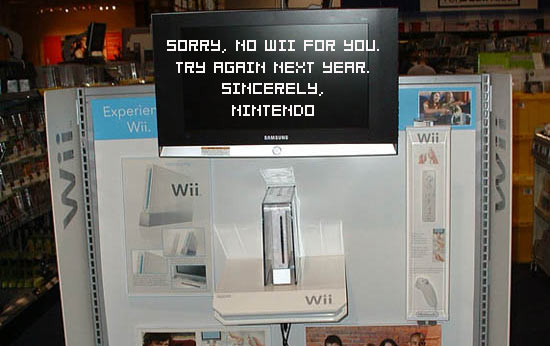Take a good, hard look at the electronics section of your local brick and mortar store, and you’re likely to find that much like a Nintendo themed version of Groundhog Day, getting your hands on a Wii in time for Christmas is about as easy as it was this same time last year. Yes my friends, it appears that that Santa’s little elves may have let us down once again. Replace the word Santa with Nintendo, and I think you’ll get the point.
Of course, you can always consider the prospect of setting sail for the shark-infested waters of the online auction opportunist — but that’s hardly an attractive way to purchase a hot item at a reasonable cost. So what is left for the weary consumer to do? Unfortunately, your options are limited at this point, should you be one of the unlucky many that are now looking to secure the few available Wiis that have trickled out of Nintendo. After much colorful language, and like the rest of us, you may be wondering just why the whole supply vs. demand thing hasn’t stabilized as of yet. Surely by now, Nintendo has learned to strike while the iron is hot!
Well my friends, it’s just not that easy. As the Wall Street Journal likes to say, Nintendo as a whole tends to err on the side of conservatism when it comes to running their business. Not sure what they’re talking about? Hit the jump and prepare to enter WSJ 101, the Nintendo chronicles.
According to “those in the know,” it’s all a matter of Nintendo’s modus operandi.
Because Nintendo puts a great deal of focus on cash flow, it tries to keep its inventory as low as possible. Such a strategy is rare among Japanese companies, which have tended to focus on revenue growth and market share.
Stated in its simplest terms, you might say that Nintendo is keenly aware that they have limited options when it comes to falling back on bad decisions. While Microsoft and Sony both have other ventures to help cushion the blow, Nintendo is very much a one-trick pony — a damn good one of the highest quality, but a one-trick pony, nonetheless.
There is always the chance that frustrated consumers may substitute a competitor’s product in times such as these, and Nintendo is well aware of that. Earlier this year, Reggie Fils-Aime, the president of Nintendo’s U.S. division, announced that Nintendo was doing everything possible to ramp up production of Wiis in order to meet increasing demand. Some may balk at this, claiming that Nintendo is purposely holding back in order to maintain customer frenzy — but it’s more likely to be that part about erring on caution coming into play once again.
There is little doubt that Nintendo is producing as many Wiis as possible in a cost effective manner, and will continue to do so. Hearing rumors that they have decided to temporarily cut back on advertising for the product tends to lend at least a little credence to this. To the naysayers, there is ammunition for their cause, as Christopher Tang, professor of supply-chain management at UCLA makes clear:
“If you flood the market, it will come back to haunt you. Nintendo may be missing opportunities by allowing other people to profit from the shortage by charging premiums but that isn’t entirely a bad thing because it creates hype. Psychologically, it’s better if the customer is begging for the product.”
On the opposite end of the spectrum lies the other dilemma in Nintendo’s double jeopardy scenario, as the WSJ points out:
“An excess supply also angers retailers, who must work harder and offer discounts to get rid of the product. The manufacturer’s financial results also suffer because they are forced to lower prices or take back the products retailers can’t sell.”
It’s literally a case of damned if you do, damned if you don’t when it comes to the situation Nintendo has found itself in. Maybe the best they can do is to walk the tightrope for a while longer, and see what happens. Any sudden moves in either direction sound like they could lead to fallout. To a company that prides itself on being profitable, the least risky option is usually the most desirable one. Sadly, none of this is doing much to provide relief to parents and the rest of the public who are desperately searching for the hottest item to come out of the videogame world in quite some time. What would you do differently, if you ran Nintendo (besides buying stock in Destructoid)?
[Via WSJ]


